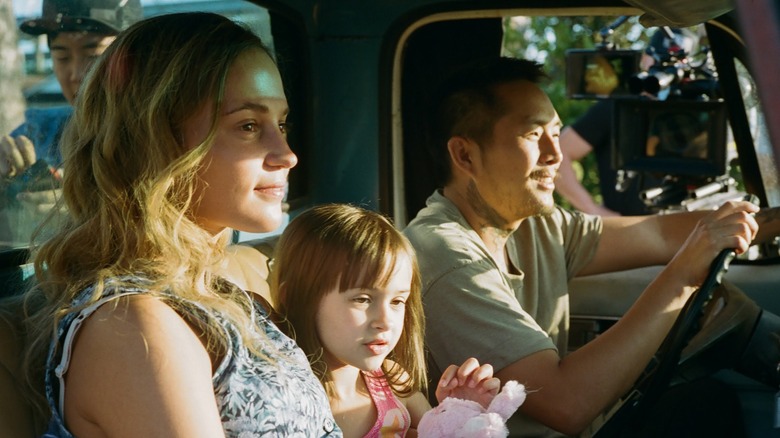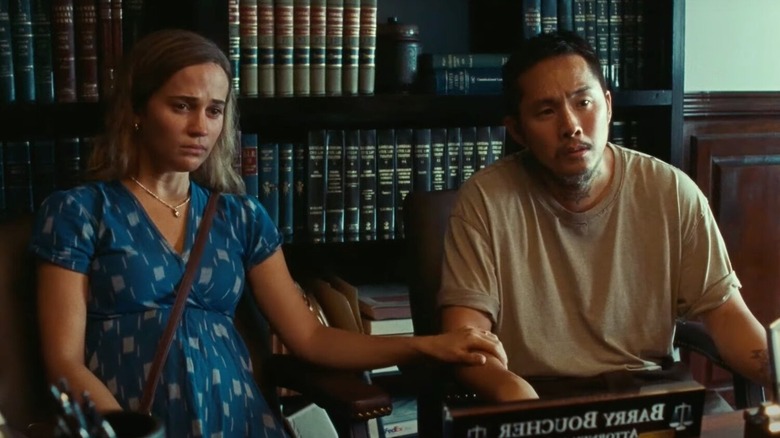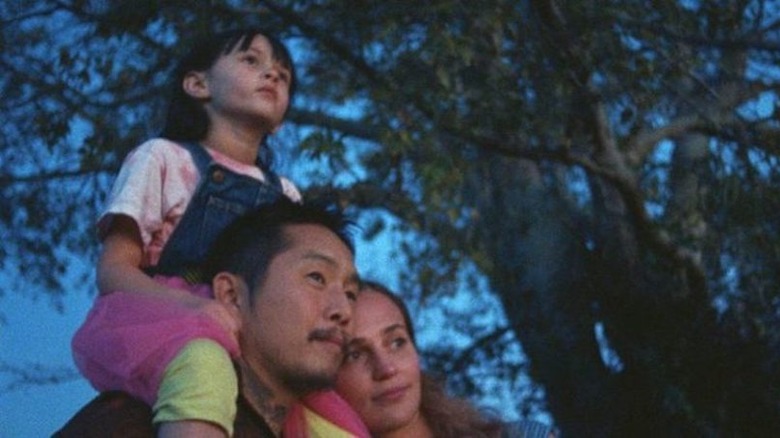Justin Chon And Alicia Vikander Search For The Definition Of Home In Blue Bayou [Interview]
Justin Chon has come a long way since he wowed Sundance audiences with his 2017 film "Gook." The writer and director of "Blue Bayou" is many years removed from being "that funny Asian guy" from "Twilight" who directed and starred in the provocative black-and-white drama about two Korean-American brothers on the first day of the 1992 L.A. race riots. It wasn't long until Chon had firmly established himself as one of the exciting Asian-American indie filmmakers to watch, following up with the 2019 family drama "Ms. Purple," which probed the generational tensions (and traumas) between Korean first and second-generation immigrants.
Now, his most recent directorial effort "Blue Bayou" tackles the daunting topic of the deportation of Asian adoptees. Chon writes, directs, and dons full-body and neck tattoos to star in "Blue Bayou" as Antonio LeBlanc, a New Orleans tattoo artist who was adopted by white parents as a young child. But a tussle with local law enforcement leads him to be detained by ICE and faced with deportation back to a country he's never known and which never wanted him.
"I think it is very complicated who gets to claim who is from what country and is their identity," Chon told me in an interview with him and co-star Alicia Vikander ahead of the release of "Blue Bayou." The film "poses those questions about what it means to be an American. Who gets to decide what that is? Is it just paperwork and legalities or is it something that you can choose? I don't think there's a clear-cut sort of answer to that question," he continued.
I chatted with Chon and Vikander about making a movie about such a politically charged issue, how they relate to their characters of Antonio and Kathy, respectively, and what it was like for Vikander to sing the Linda Ronstadt song that inspired the title of the film.
"What it means to be an American"
Justin, I like that with each of your directorial films that you've made, that you're tackling different aspects of what the Asian immigrant story can be. What made you want to explore the issue of the deportation of Asian adoptees with "Blue Bayou"?
Justin Chon: Yeah, it's also happening to people beyond just Asian Americans, but specifically, yeah I think one of my main sort of purposes of stepping behind the camera is to bring empathy to my community and that the Asian American experience is very diverse. I feel the adoptee experience is a big sort of pillar in the community, but is rarely talked about. There's not much representation in film and television about that experience, so I thought it was very important to try to represent that community.
And Alicia, how aware were you of kind of this issue? It's a very America-centric kind of story and you're coming in kind of as someone who is maybe not as fully embedded in this kind of ongoing topic. How aware were you of this issue when you came in to do the film?
Alicia Vikander: Well, I mean, immigration politics I think is ever-present not only in America, but other parts of the world. But almost aside from the politics, I mean, this particular situation that Antonio is faced by in this film, to me, was something I had no clue about. In one way, this is about children that have actually legally been adopted into countries and for me to then realize that the reality is that if not the right paperwork were filed, suddenly there is a loophole where their own home countries, their own government can't protect them and instead can use it by deporting them and sending them away, not only from their homes, but from their families and sometimes even their children.
When I finished Justin's script, and I think the last page, it did something that I hope maybe people will do watch the film, I grabbed my phone and I couldn't help myself but wanting to learn more. I just started to Google and realized then that this was actually a global issue.
So Justin, one of the first lines of dialogue in the movie is Antonio is asked, "Where are you from?" Which is a very familiar question to many Asian Americans or Asian diaspora people, but "Blue Bayou" makes this question a little more complicated, because of the nature of Antonio's adoptee background. How did you go about parsing this question, this kind of complicated theme, of what home is and what it means to, especially adoptees?
Chon: I mean, I think it is very complicated who gets to claim who is from what country and is their identity. To me, sometimes immigrants, the consciously chose to go to that country and live there and call it home as opposed to just being born somewhere. I think that in "Blue Bayou," Antonio is brought to the United States, but obviously he didn't have a say in that and it is very introspective and poses those questions about what it means to be an American. Who gets to decide what that is? Is it just paperwork and legalities or is it something that you can choose? I don't think there's a clear-cut sort of answer to that question. I think at the end of the day, that's what I hope that the film does is it poses a lot of questions and starts conversations.
So with such a politically charged topic as this, was there a line that you had to walk while making this film or is that something that you didn't want to be beholden to?
Chon: Absolutely. I mean, this movie about humans. Of course you have to help the audience understand the legality of everything and legislation that's causing this issue, but ultimately this is a story about Antonio and Kathy and them trying to keep a family together in the face of dealing with this. There's incredible amounts of love and I wanted to make sure that it felt real and visceral and that it felt authentic. These are not perfect people and I think, hopefully in success people watch this and feel like they spent time with an actual family for two hours.
"Since I left my baby behind on Blue Bayou..."
Yeah, and Alicia, you went into this movie and had to put on a very specific regional accent and then you also have a great musical scene where you sing. So like the preparation for going into this film, was that something that was a challenge for you or was that something, just one of your many accents that you've taken on in recent roles?
Vikander: Yeah. I mean, I also want to give to Justin the fact... So the first time we had a chat, Justin and I, I read the script and I told him, I was like, being a foreign actress, was Swedish, I kind of really care for films where you kind of shine a light upon maybe the stories that are surrounding you in an everyday life, but that you never get to see on film. I wanted to play that kind of naturalistic drama in America, but no one has ever really offered me that.
And Justin said, "Well, I've seen your first film," a Swedish film with an international title called "Pure." Not many people have seen it. I was like, "Wow, that's cool," and Justin said, "Well, people kind of see you or they thought you had a British accent or that you play some royals or queens or whatever," and he was like, "Is that where you're from?" And I was like, yes, in that film he got in one way to see that maybe I'm closer to Kathy than many other roles that I've played. I was brought up in a smaller town, much more of a working class environment where the single mom mostly who took care of me and we lived in a small studio apartment. That was my reality. One way the women like Kathy or that family I saw represented in my community, even though it's on the other side of the world.
So actually, we kind of connected over the similarities that maybe I've had with this family and I think that's the beauty of what he does with his filmmaking as well. But then of course, yeah the accent of course I need to get right. But I absolutely loved going to New Orleans for a few weeks and get to meet people who were so kind of open and generous. Invited me to some type of, even their workplace for me to get a reference of where Kathy might hang out in New Orleans and I got to sing. I mean, I said to Justin, I was like, "Are you really sure because this is a quite difficult song." He kind of shut it down, really immediately it was like, "Well, it's the title of the film," and I was like, "I get that." But in the end, it's my favorite scene in the film that I got to do, so I'm very thankful that he pushed me to do it.
So the character of Parker, played by Linh Dan Pham, is Vietnamese and that's something that I appreciated. It was kind of a nice surprised for me, being Vietnamese myself. But what was the purpose in making this character specifically Vietnamese? Because there's a whole connection drawn between Antonio and Parker and how they both are Vietnamese and Korean people came out of war, but did you set out to have that character be Vietnamese in the first place and what was the intent of bringing that character in for the story?
Chon: Yes, absolutely. It's part of the reason I set in New Orleans, because there's a huge enclave of Vietnamese people who are relocated there after the war and a lot of people were placed in the South, in Texas, Louisiana, Mississippi. I also just think it's funny when you watch a film and you're only allowed one sort of Asian ethnicity per film. So it was just... It was nice to see two sort of Asian ethnicities that were adjacent to one another and you could kind of see the similarities and differences. But more importantly, I felt like Parker served as a mirror to Antonio and when you're dealing with someone who is dying, it puts your problems into perspective and makes you become introspective and think kind of more clearly about whatever you're dealing with. So they come into each other's lives at a point of he's having a death of being an American and she's having a physical death. I thought that there was something poetic about that.
"Blue Bayou" hits theaters on September 17, 2021.


